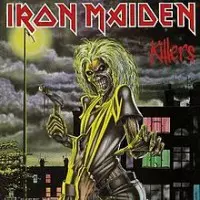Listening to Iron Maiden without Bruce Dickinson on the mic is like listening to an Iron Maiden cover band. I'm sure that assessment doesn't sit well with original frontman Paul Di'Anno ('90s stand-in Blayze Bayley would probably agree though), but it's Dickinson's operating wail that complete Maiden's sound. Still, though, for diehards, Di'Anno's two records with the band make for an interesting listen. Killers, Iron Maiden's second album, and Di'Anno's last with the band before he was fired for underperforming, is arguably the best Iron Maiden album that doesn't involve Dickinson.
Musically, this record shreds just as well as the better known Maiden records. Bassist Steve Harris composed most of the music, and the first half of the album just keeps upping the ante. "The Ides of March" is a perfect instrumental opener, gradually adding in bigger and bigger guitar flourishes to drive crowds crazy. "Wrathchild" has a driving bassline and a searing guitar hook to propel it. All of these songs have kick ass guitar solos.
But there's something holding back these songs, and it's Di'Anno. His typical singing style is a little bit lower than Dickinson's. He has more of a snarling hard rock style, and it doesn't quite suit the musical pyrotechnics going on around him. When he goes for a higher, more operatic approach, a la Judas Priest, it comes off as forced and underwhelming. The songs are at their least entertaining whenever he takes the mic, both lyrically and vocally.
Granted, the band was still defining its sound elsewhere as well. Most of the tracks were written during the band's formative years, with the exception of "Prodigal Son" and "Murders in the Rue Morgue," and it kind of shows. "Genghis Khan," for example, is more bluesy hard rock than metal, and while it boasts a sweet guitar solo near the end, the verses don't have the same driving energy heard later on, say, Powerslave. In hindsight, Killers feels like a trial run for what Iron Maiden would become.
Still, though, Iron Maiden had decent chart success during the Di'Anno years, so firing the lead singer was still a little bit of a gamble. After all, by this point the band had already had successful tours with Judas Priest and Kiss. Luckily, they already had a replacement in place: Bruce Dickinson. Any doubts that Dickinson was a better fit for the band were quickly allayed by Iron Maiden's very next album: The Number of the Beast.
